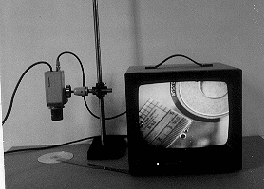

PURPOSE: See if a compact disc will play even if it has a small hole drilled through it.
DESCRIPTION: According to the theory of the compact disc, the Cross Interleave Reed-Solomon Code (CIRC), in which the data are impressed on the disc, is coded so as to override certain types of localized damage to the disc, correcting for so-called burst errors. This is done so as to avoid playback problems as the disc ages and gets a bit scratched up.
Being scientists, we decided to check this by drilling holes in a compact disc to see if it would still play. It did not take long to find a CD in which it was imminently worth drilling a hole: a bunch of hackneyed overtures by Rossini. Did it work?
It sure did!! The CD played right past holes of 0.0083" (0.2mm), 0.0135" (0.34mm), 0.021" (0.53mm), and 0.032" (0.8mm), and only sometimes gave small clicks for a hole of 0.062" (1.55mm). A 0.118" (2.95mm) hole really did the job, causing large clicks and skipping.
You might ask why we drilled all those holes. Well, we started small and drilled until the CD started to malfunction! The time location of each hole is written on the CD package.
SUGGESTIONS:
REFERENCES: (PIRA unavailable.)
EQUIPMENT: CD with holes of increasing size, CD player and audio system.
SETUP TIME: None.
 |  |  |  | 
|